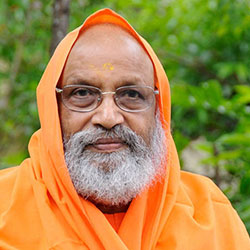
Knowledge is the Only Means to Freedom
Why is knowledge the only means to freedom (Moksa)? Because the freedom sought is limitlessness itself, that choiceless human goal underlying all other human struggles for limited ends. Limitlessness is not something that can be created or produced. If limitlessness exists, it is ever existent – an ever existent fact to be discovered. If my essential nature is that of a limited being, I can never become limitless. Limitlessness, by definition, can never be the end product of a process of becoming. An endless series of limited things will not constitute limitlessness. Limited means cannot produce limitlessness. Limitlessness either is or is not.
Therefore, if I am by essential nature bound, there can be no mok`a for me; I can never be absolutely liberated. And, most of the time, as I look at myself and the world around me, I judge myself to be bound – limited, inadequate, sorrow-prone. But, at the same time, there is within me that love for freedom which is so innate in everyone, a love for freedom that in occasional moments of joy or insight seems to be fulfilled as fact, contradicting all my experiences of inadequacy. Thus, even though my usual experience is that of being limited, on the basis of my innate need to be free, backed by limitations, on the basis of my innate need to be free, backed by intimations that freedom may be my nature, I am led to search for knowledge of the Truth of myself to discover whether or not I am that being I want to be. If the freedom I seek is an accomplished fact, my failure to appreciate that fact can only be due to ignorance; and if my only problem is one of ignorance, search for liberation becomes a search for the knowledge which will dispel the ignorance that keeps me from knowing myself as I am.
A search for moksa (liberation) which has become a search for knowledge is an informed mumuksutvam which is a quest for freedom characterised by recognition of the underlying basic human need to be free; by realization from one’s own experiences that one’s efforts do not produce lasting freedom; and by the comprehension that it is through knowledge and knowledge alone that one does gain freedom.
It is a mumuksutvam which has matured into Jijnyasa (a desire to know) which indicates a state of mind bent on inquiry for the sake of knowledge
What knowledge does the mumuksu seek?
Atmajnanam (the knowledge of the Truth of oneself) which also can be called tattvajnanam (the knowledge of the Truth). Tattvajnartha darsanam simply is a value for ‘mature’ mumuksutvam – a value for keeping in mind as one’s primary goal tattvajnanam, which is synonymous with moksa (liberation).
Describing the discovery of the mumuksutvam which leads to jijnyasa, it is said in the Upanishad that the wise person described in the Upanishad, through analysis of his own experiences, has recognised that underlying in all struggle for security, pleasure and merit is the basic need to discover oneself complete and free from want of limitation of any kind; he, also, has appreciated that no amount or kind of effort can produce the completeness he seeks. The adequate being everyone longs to find in oneself cannot be produced by a process of becoming. Limitlessness cannot be created. The only possibility is that indeed, I am limitless and am ignorant of my true nature. The resolution of ignorance is by knowledge. Therefore, if I be that which I want to be (limitless), I have to gather that fact through knowledge. There is no other way.
Thus, the Brahma sastras begin:
Thereafter, therefore, inquiry into Brahman. ‘Thereafter’ indicates an immediately following condition after a state which has gone before. Here the state that gone before is the discovery within oneself of a mature mumuksutvam characterised by discrimination, dispassion, certain values and the discernment that only through knowledge of the Absolute (brahman) can liberation be gained. ‘Therefore’ indicates the purposive connection between this state-that-went-before and the state-that- comes-after. The succeeding state, which is the result of informed, value-based mumuksutvam is brahma-jijnyasa, the desire to know brahman – inquiry for the sake of knowing brahman, which is the same as an inquiry focused on tattva, the Truth of everything; brahman, the Absolute, is the Truth of everything.
Based on the book “The Value of Values” by Pujya Swami Dayananda Saraswati